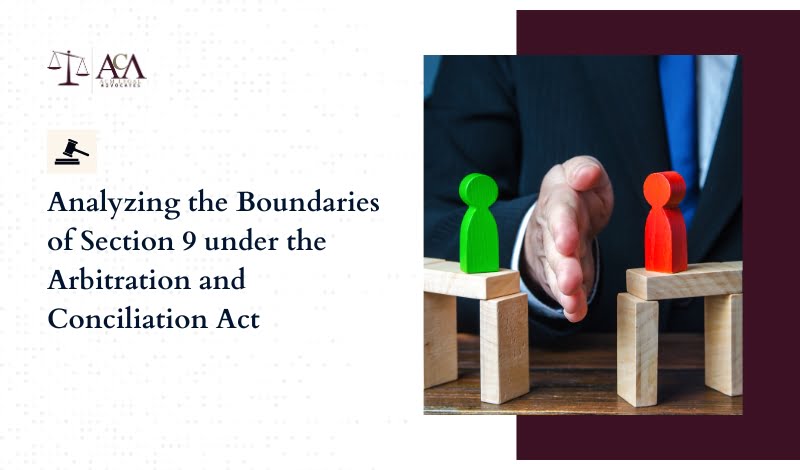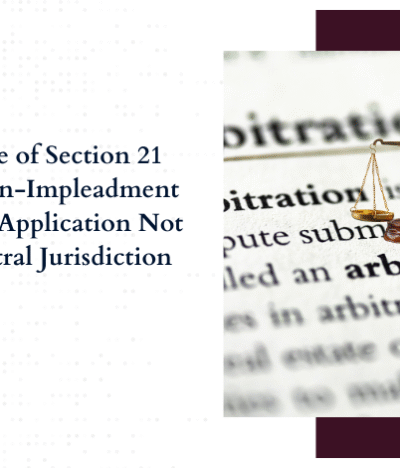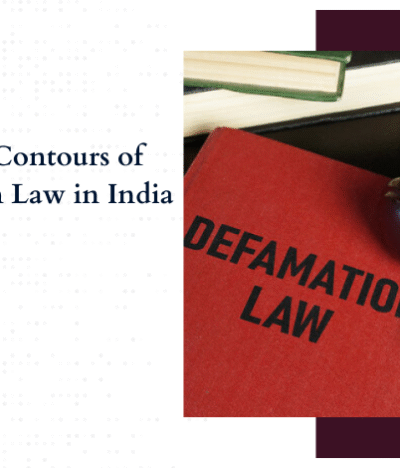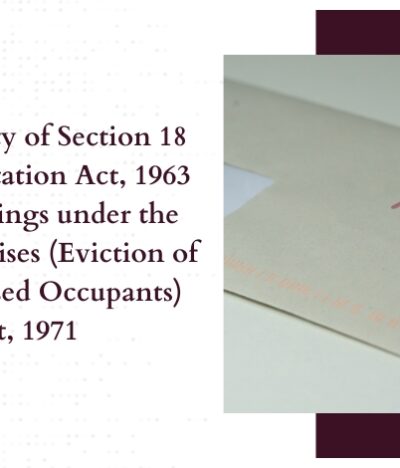Delhi High Court’s Stance on Contract Termination
The High Court of Delhi has made a significant ruling regarding the limitations of Section 9 of the Arbitration and Conciliation Act (A&C Act). This decision, presided over by Justice Chandra Dhari Singh, came to light in the notable case of Yassh Deep Builders LLP (Petitioner) vs. Sushil Kumar Singh & Anr (Respondents).
The court established that Section 9 of the A&C Act does not facilitate the revival or restoration of contracts that have been conclusively terminated. The ruling highlights that while the court holds jurisdiction under Section 9, it does not possess the authority to enforce the performance of contracts that are by nature, terminable.
This reinforces the principle that all judicial interventions must adhere strictly to established statutory constraints, particularly pointing out that contracts inherently designed to be terminable do not qualify for specific performance under Section 14(d) of the Specific Relief Act.
Facts of the case
The dispute centers around a collaboration agreement dated May 15, 2018, between the Petitioner, Yassh Deep Builders LLP and the First Respondent, Sushil Kumar Singh. Under this agreement, the petitioner agreed to develop certain parcels of land owned by the respondent into commercial and residential complexes. The agreement stipulated that the petitioner would pay Rs. 5.96 crores as non-refundable earnest money in addition to transferring a part of the developed land to the respondent as consideration.
The case took a contentious turn when a significant cheque issued by the petitioner, amounting to Rs. 1,46,50,000/-, was dishonoured due to ‘insufficient funds’. This financial mishap led to the drafting of the First Supplementary Agreement, which adjusted the scope and terms of the original project due to the petitioner’s financial inadequacies.
The complications further escalated when the parties allegedly entered into a Second Supplementary Collaboration Agreement on August 17, 2020—a document whose authenticity was later contested by the petitioner, suggesting it was a product of collusion between the first and second respondents.
The turning point emerged when the first respondent issued a termination letter on September 29, 2021, effectively ending the collaboration agreement. The petitioner claimed to have not been served with this notice of termination until December 14, 2022, when it was informed about the potential sale of the disputed property, prompting immediate legal action under Section 9 of the A&C Act to maintain the status quo and prohibit any creation of third-party rights on the subject property.
Contentions of the Involved Parties and Legal Arguments
The petitioner moved to enjoin the respondent from altering the existing conditions and from engendering interests in the subject property in favour of any third party, based on the following legal premises:
Indeterminable Agreement
Asserted that the collaboration agreement was intended to be indeterminable and could not be unilaterally terminated by the respondent.
Authenticity of Second Supplementary Agreement
Challenged the legitimacy of the Second Supplementary Collaboration Agreement, alleging it was a result of collusion between the respondents.
Payment and Performance
Highlighted the payment of Rs. 4.21 Crores as Earnest Money Deposit and the efforts made in obtaining necessary clearances to showcase readiness and willingness to perform the agreement’s terms.
Authority of Second Respondent
Contested that the second respondent was unauthorized to enter into the Second Supplementary Collaboration Agreement on behalf of the petitioner.
The respondents contested the admissibility of the petition on the subsequent legal bases:
Termination of Agreement
Argued that the collaboration agreement had been rightfully terminated, thus negating any basis for specific performance.
Petitioner’s Non-Performance
Pointed out the petitioner’s inability to adhere to the project timelines and secure the required approvals, indicating a lack of readiness and willingness.
Economic Discrepancy
Asserted that the current value of the property vastly exceeds the amount initially agreed upon, making specific performance inequitable.
Validity of the Termination
Maintained that the termination of the agreement was within legal bounds and consequently nullified the arbitration clause.
Legitimacy of Second Supplementary Agreement
Insisted that the Second Supplementary Collaboration Agreement was validly executed with the second respondent having proper authority at the time.
Determinable Nature of Agreement
Argued that the agreement was commercial and inherently determinable, and therefore, not suitable for specific performance under Section 14(d) combined with Section 16 of the Specific Relief Act.
Legal Analysis and Conclusion by Delhi High Court
The Hon’ble Court’s ruling focused on several pivotal areas of contractual and arbitration law, offering clarity and guidance on complex legal issues.
Firstly, the Court established that the collaboration agreement between the parties had been definitively terminated as of September 29, 2021. This termination formed the crux of the legal debate, influencing the Court’s interpretation of the petitioner’s claims under Section 9 of the Arbitration and Conciliation Act. The Court elucidated that Section 9 does not extend to reinstating contracts that have been conclusively ended by the parties involved.
A critical aspect of the Court’s analysis was the clarification that judicial authority under Section 9 does not encompass enforcing specific performance of contracts designed to be terminable. This legal standpoint was underscored by reference to Section 14(d) of the Specific Relief Act, which specifies that terminable contracts are exempt from specific performance mandates. This point was pivotal in the Court’s decision-making process, affirming that legal actions must align with statutory limitations.
Moreover, the Court evaluated the petitioner’s “readiness and willingness” to fulfill contractual obligations. It concluded that the petitioner fell short of demonstrating the requisite commitment, particularly in light of financial constraints and delays in securing necessary approvals. This lack of demonstrated readiness and willingness further diminished the petitioner’s claim for specific performance.
The Court also considered the significant increase in the property’s value, juxtaposed with the original contract terms. The disparity between the earnest money provided and the property’s current market value highlighted the impracticality of enforcing the original terms of the contract.
Lastly, despite the disputes surrounding the Second Supplementary Collaboration Agreement, the Court determined that the contract’s nature as commercial and inherently determinable precluded specific performance. This conclusion was reinforced by the principle that commercial agreements, by their essence, can be concluded or terminated, thereby not qualifying for specific enforcement under the noted legal frameworks.
The Delhi High Court’s ruling in this case sets a significant legal precedent, highlighting the boundaries of arbitration law and the specific performance of contracts within the Indian legal system. This judgement serves as a crucial reference point for legal professionals and parties engaged in contractual disputes, particularly within the realms of property development and collaboration agreements.






